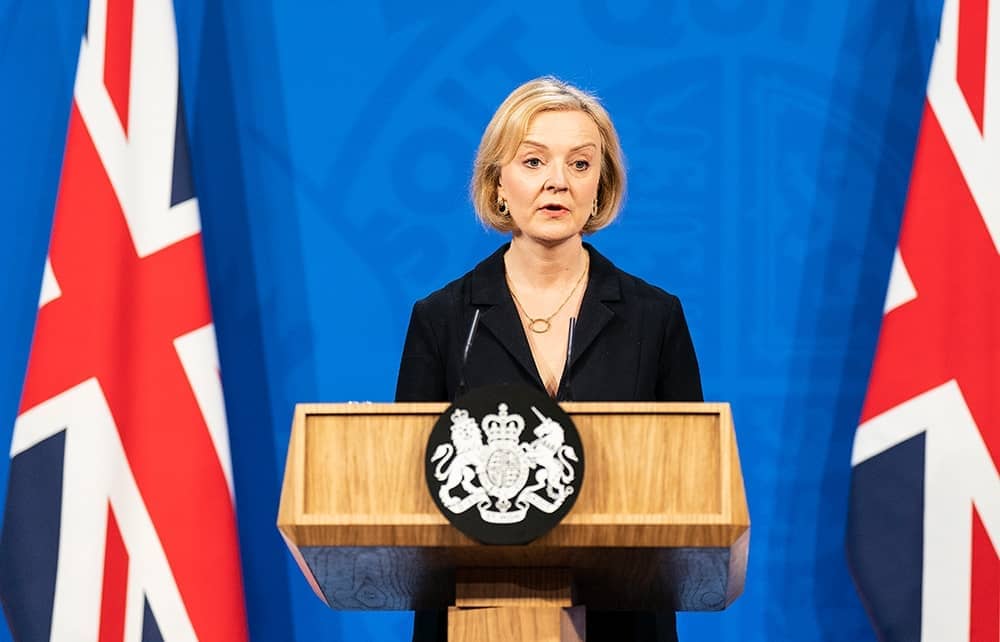It was a year ago on Wednesday that Liz Truss left office. As the ministerial cavalcade rolled out of Downing Street for the short drive to Buckingham Palace, so she entered the history books as the shortest-serving Prime Minister in British history. Truss was still reeling from the events of the past seven weeks. The rejection of her mini-Budget by the world markets had been dubbed Britain’s ‘economic Suez.’ But in keeping with her character and past record, she did not follow the example of Anthony Eden and ignominiously slink off into retirement. After a short holiday – her first non-ministerial break in more than a decade – she returned and began to plot her next moves.
Truss’s most important decision in the year since has been to stand again as a Conservative candidate at the next election. Every premier since Margaret Thatcher with the exception of Theresa May has opted to quit parliament at the first opportunity since leaving office. But Truss, reselected by her South West Norfolk association with a majority of 26,000, clearly intends to be a voice in the Commons for years to come. Unlike May – who keeps her interventions rare – Truss prefers to use that voice in the press rather than parliament. Having kept an initial silence for her first four months, she has since done interviews about her time in office with the Spectator, revealed her plans for a forthcoming book in the Mail on Sunday, written a 4000-word-essay for the Sunday Telegraph and held a Q&A at the Institute for Government last month to mark the first anniversary of her premiership.
Her choice of forums point to the role that she sees herself playing in future. With the Tories looking likely to now lose the next election, a battle seems set to take place about what comes next. Truss – who won the summer 2022 Tory contest by a convincing 15-point margin – clearly feels she has a role to play in the internal party debate that follows. She has offered advice to Tory candidates going for parliamentary selections and delivered a star turn at the ‘Great British Growth Rally’ at Tory conference earlier this month. Both the energy she radiated and the reception she received were a marked contrast to the coolness which greeted the underwhelming efforts of frontbenchers in the Manchester hall. In parliament too, she has played her part in setting up the now 60-strong Conservative Growth Group of MPs, led by former lieutenants Simon Clarke and Ranil Jayawardena. But her work has largely been outside the chamber, rather in it, with her most notable Commons moment to date coming when she voted against the Stormont Brake back in March – her first time voting against a three-line Tory whip.
As a former policy wonk herself, it was natural that a departure from office meant more time with Westminster’s free market think tanks too. Following her departure from office, a new project was drawn up after months of discussions at fixtures at places like the Institute of Economic Affairs – the Growth Commission. Launched in June, it aims to address one of Truss’s main criticisms from her time in office about the methods of economic modelling used by the Treasury and OBR. Truss convened the commission but holds no formal role within it. Unsurprisingly though, it is her name that looms large over any media reports about the Growth Commission’s work, as shown by the coverage of its upcoming ‘alternative Budget’ next month.
Her involvement in think tanks has not been limited to this side of the Atlantic either, with Truss continuing the jet-set life she led as first Trade and then Foreign Secretary. In April, she delivered the Heritage Foundation’s Margaret Thatcher Freedom Lecture in Washington. Here she attacked ‘woke culture’, ‘the cost of government crisis’ and what she called ‘co-ordinated resistance’ in office from her party, the ‘British corporate establishment’, the IMF and President Biden. It was one of six trips abroad worth £58,000 that Truss has thus far declared in the MPs’ register, along with £24,000 worth of usage from Heathrow and Gatwick’s suites on 14 occasions. Ted Cruz, Greg Abbott and Paul Ryan were among those she met last week on her latest US tour. ‘We are so grateful for our British friends,’ tweeted Cruz ‘and for strong leaders on the global stage who will champion conservative principles and defend liberty.’
Truss has certainly been keen to play up her credentials as a cold warrior, with trips to Tokyo and Taipei to warn of the threat from China. In May she became the first former British prime minister since Margaret Thatcher in the 1990s to visit Taiwan, warning that ‘the only choice we have is whether we appease and accommodate’ Beijing ‘or we take action to prevent conflict.’ Truss though remains something of a divisive figure, even among China hawks in her party. ‘She gets you headlines: but are they the right ones?’ said one ahead of her visit, questioning whether her association with Taiwan’s cause was something of a mixed blessing. Foreign policy though looks set to remain another focal point for Truss and will form the centrepiece of her book next spring.
A common theme runs throughout Truss’s post-premiership initiatives. Her name brings with it guaranteed profile and media attention, valuable commodities in the noisy world of Westminster. But some allies fear her association risks damaging the very same causes that she supports. Truss herself believes that events will ultimately prove the wisdom of her efforts in office. Resilient, energetic and determined, she will bring the same qualities that made her Prime Minister to life after No.10 too. Like a shark, she must always keep moving forward. One year on from leaving office, Liz Truss shows no sign of leaving the political stage.







Comments